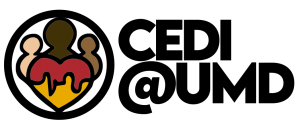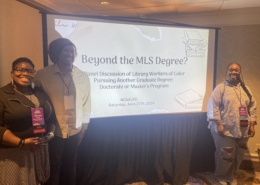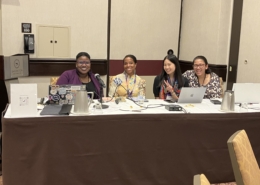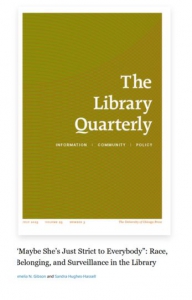Project and Studies
This project funded and supported by IMLS and the Durham Public Schools Foundation HOPE Network was a collaboration with the Durham Public Schools Exceptional Children Services, the DPS foundation, the Exceptional Children’s Assistance Center (ECAC), the Durham Special Needs Advisory Council (DSNAC), and the Durham County Library was a collaboration to build more equitable access to curricula and resources for students with disabilities and their families during COVID-19 emergency online learning. The team collaborated to survey family and student needs during the transition online, created technology literacy training, and produced examples of accessible materials for teachers, parents, and children.
Posters and Presentations
Anantachai, T., Chesley, C., Hodge, T., & Williams, J. (2024, July). We Got the Receipts: Navigating Reimbursement Culture in Academic Librarianship. Presenter at Inclusion, Diversity, Equity, and Accessibility in Libraries & Archives 2024. Toronto, Canada.
Anantachai, T., Chesley, C., Hodge, T., Pun, R., & Williams, J. (2024, July). Challenging “Racial Monolith Myths” in the Library Profession Through Critical Race Theory: A Panel Discussion. Panelist at Inclusion, Diversity, Equity, and Accessibility in Libraries & Archives 2024. Toronto, Canada.
Ndumu, N. Mendez, M. Hodge, T., & Prosper, S. (2024, July). Black and Immigrant: Understanding Black Im/migrant Identity in Libraries and Librarianship [Panel Presentation]. Panelist at the National Conference of African American Librarians 2024. New Orleans, LA.
Hodge, T. Mendez, M., Kaaba, V. & Williams, J. (2024, July). Beyond the MLS Degree? A Panel Discussion of Library Workers of Color Pursuing Another Graduate Degree: Doctoral or Master’s Program [Panel Presentation]. Panelist at the National Conference of African American Librarians 2024. New Orleans, LA.
Goodman, X. and Hodge, T. (2024, July). Grief and Life: The Things We Lose and Carry Presenter at the National Conference of African American Librarians 2024. New Orleans, LA.
Curliss, L. & Hodge, T. (2023). Centering Care: Aunties as Praxis within the Academic Space, poster presented at the 2023 Association for Library and Information Science Education in Milwaukee, WI.
Smith, N., Gibson, A., Oyedele, D., Chiewphasa, B., & Ball, C. (2023). Librarians for critical digital justice: a space to explore digital inequities in academic institutions, presented virtually hosted by the Department of Information Studies, University College, London (UCL).
Gibson, A.N., & Bowen, K.L. (2019). Developmental Personal Health Libraries: Supporting Independence through Design, poster presented at The 21st International ACM SIGACCESS Conference on Computers and Accessibility (ASSETS ’19). Association for Computing Machinery, New York, NY, USA, 627–629. DOI:10.1145/3308561.3354635
Gibson, A.N., & Bowen, K.L. (2019). Health Information at Intersections: Toward More Inclusive Personal Health Records for Marginalized Users, poster presented at the Association for Information Science and Technology 82nd Annual Meeting in Melbourne, AU.
Gibson, A.N. (2019, May 23). Justice, Equity, or Charity? Ethics and Responsibility in Inclusive Library Design, presented at the 2019 Big Ten Academic Alliance Library Conference, University of Michigan, Ann Arbor, MI.
Gibson, A. N., & Hanson-Baldauf, D. (2019). Re-Situating Information Poverty: A Community Conversation on Information Seeking and Exchange presented at Pacific Rim Conference on Disability & Diversity, Hawaiʻi.
Publications
Gibson, A. N., & Hughes-Hassell, S. (2023). “Maybe She’s Just Strict to Everybody”: Race, Belonging, and Surveillance in the Library. The Library Quarterly, 93(3), 277–293. https://doi.org/10.1086/725068
Gibson, A. N., & Martin, J. (2019). Re-Situating information poverty: Information marginalization and parents of individuals with disabilities. Journal of the Association for Information Science & Technology. [PDF]
Gibson, A. N., & Kaplan, S. (2017). Place, community and information behavior: Spatially oriented information seeking zones and information source preferences. Library & Information Science Research, 39(2), 131-139. [PDF]




